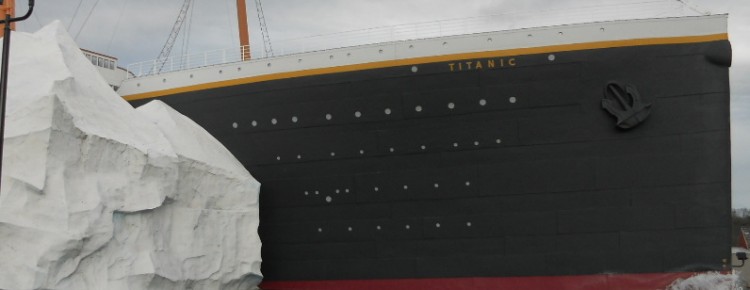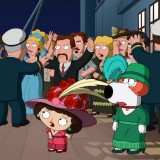Very early in the morning on April 15, 1912, the Titanic sank below the icy waters of the North Atlantic and careened to its final resting place at the bottom of the ocean. Yet today, 103 years later, people are still as fascinated with the story as they’ve ever been.
I’m a huge Titanic fanatic—and not just because of the movie. Yes, I absolutely adore the 1997 James Cameron epic, and it was my introduction into the fascinating world of the ill-fated liner, but the movie is not the only reason for my fervor.
I have sort of a sordid history with the movie. When it opened in December of ’97, I didn’t want to see it at first. I wasn’t interested in the story (what very little I knew about it at the time), and I have issues with underwater things anyway (but that’s a whole other story). I also told a good friend, when he asked if I had seen it yet, that I didn’t want to cry for three hours.
“Ok, but aren’t there times when you want to cry?” he replied.
I realized he was right. And I was in a situation at the time where this was very true. I won’t go into it now, but it involved relationships and other baloney.
So he talked me into seeing it, and I did cry for probably a good two of those three-plus hours. I remember how silent the theatre was during the movie’s first 20 minutes. It was like people were afraid to eat their popcorn.
Needless to say, I loved the film. But that’s putting it lightly. In truth, I became completely obsessed with it. I saw it six times in the theatre. I hadn’t seen a movie more than twice in the theatre since I was about 11 years old.
While some friends at the time liked to blame Leonardo DiCaprio for my loving the film—I was young enough and definitely a fangirl at heart (and still am), so it makes sense—he was not the reason. I think he’s a brilliant actor, and I certainly wouldn’t kick him out of my stateroom for eating Triscuits, but I also knew the storyline between Jack and Rose would never have been possible at the time. He was not the reason I became obsessed.
It was the story. I became completely fascinated with everything about it: the ship, the real-life sinking, the people involved, the era (one I was already studying in my dance scholarship), the bizarre coincidences. It was the first of several large liners that sank in the early 1900s, and the first one caused essentially by nature, as opposed to a bombing or other man-made threat (the Lusitania, for example, sunk in a similarly horrendous fashion, but it was torpedoed at the start of World War I).
There are so many reasons, and many of them well known, why Titanic should never have sunk. It was a mechanical marvel at the time, and it took huge precautions to be a better ship than the ones that came before it. From the travel speed to the missing binoculars, so many strange, simple things went wrong to cause the ship to strike the iceberg, and then to sink. And of course people have new theories all the time: theories about the rivets used, about the atmosphere of the night sky, and the water at the time.
And even hitting the iceberg didn’t have to be the death knell it was. If Titanic had hit the iceberg head on, she probably would have stayed afloat. But because First Officer Murdoch (not Captain Smith) tried to turn the ship, the iceberg did more damage to the side of the boat, letting much more water in, and ultimately dooming it.
None of this mentions the premonitions that came well before the incident, with the 1898 book. Morgan Robertson’s short story Futility, or the Wreck of the Titan told about an enormous ship that sank in April after striking an iceberg. Its dimensions were eerily similar to Titanic’s, and the details around what happened were similar as well. And this was a good 14 years before the real story.
In addition to all of these logistical aspects, the general humanity of the story is captivating. Not just the devastating number of lives lost, but the individuals behind those lives. Not just the changes that came as a result of the sinking, such as Marconi and lifeboat regulations and other rules of the sea. (I’m also convinced that it’s not a coincidence that Tax Day and the anniversary of the sinking are the same day, but I haven’t researched it yet.) While those stories are astounding too, this situation is the perfect illustration of hubris.
I’m not a religious person, but if ever there were an example of the existence of God (or Mother Nature), this is it. The puny humans start to think they can control everything, and even go so far as to challenge God (“God Himself could not sink this ship”), and God says, “oh yeah? Try this!”
Titanic struck the iceberg at 11:40 p.m. on April 14, 1912, and by 2:20 a.m. on the 15th, a mere two hours and forty minutes later, it was gone. To commemorate the 103rd anniversary of the sinking this week, I’ve invited some of my friends over to watch the Cameron blockbuster, and Cameron’s brilliant follow-up documentary, Ghosts of the Abyss, with me again. It’s been years since I’ve seen the film, and I’m excited to watch it again, especially with some friends who’ve never seen it. It will be fun to experience it anew through them.







I saw a documentary recently where a guy found an archive in Germany containing very detailed weather data for the Atlantic during the time period when the Titanic sank. After a lot of research, he concluded that a mirage might actually have been responsible for the sinking: basically, it might have been completely impossible for the lookouts to see the iceberg even if they’d had binoculars. This article has a summary: http://www.smithsonianmag.com/science-nature/did-the-titanic-sink-because-of-an-optical-illusion-102040309/
I’d highly recommend watching the documentary — I found it on Netflix.
Hi Tina!
Yes, I’ve seen that documentary! It’s fascinating. I hint at it indirectly in this post. 🙂
Thanks for reading!
Based on readings, the Titanic was considered to be its own lifeboat and was considered to last long enough for all passengers to be evacuated, ref: https://en.wikipedia.org/wiki/Lifeboats_of_the_RMS_Titanic. Titanic met the standards of the day for lifeboats which was based on the size of the ship, not on the passenger count. The link lists a number of reasons for the collision: http://cosmiclog.nbcnews.com/_news/2012/04/01/10970732-10-causes-of-the-titanic-tragedy
I don’t know if Titanic would be considered its own lifeboat, but they certainly didn’t think they would need any lifeboats, which is why they didn’t worry when there weren’t enough boats to hold all the passengers–especially considering they were within the regulations of the time. That’s also why some of the upper class passengers didn’t want to get on the lifeboats after the collision. Not knowing the full extent of the damage, they figured they’d be safer on the Titanic than in a tiny lifeboat. But it’s definitely another reason the whole incident is so fascinating. The self-assurance, the hubris, that went into it.
Thanks for reading!
[…] around a period I studied a lot), and got plenty of good reviews, it starts with the sinking of the Titanic. Of course I had to watch! It definitely did not […]
[…] you’ve read my blog or know me at all, you know that I’m a massive Titanic fanatic. Today is the 104th anniversary of the sinking of the Titanic, and yet—shock of all shocks—I […]